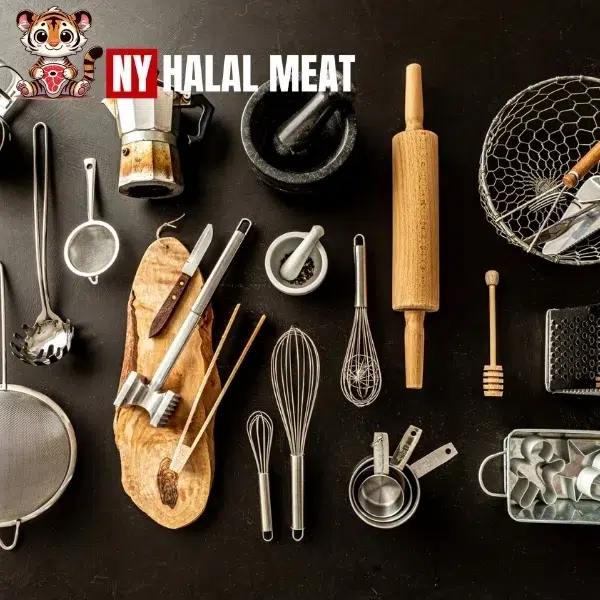Halal Kitchen Essentials I Can’t Live Without: A Guide to Building a Halal-Conscious Culinary Space
Building a halal kitchen is a deeply personal and spiritual process that combines religious devotion with practical organization. It’s not simply about excluding pork or alcohol—it’s about cultivating a space where every aspect of food preparation reflects mindfulness, purity, and compliance with Islamic dietary laws. A well-organized halal kitchen not only simplifies cooking but also reinforces your values and beliefs through everyday choices. For more resources on halal living, visit nyhalalmeat.com.
Designating Separate Utensils and Tools for Halal Cooking
In households where halal and non-halal foods may both be present, separation is key. Having dedicated utensils such as knives, cutting boards, and cookware used exclusively for halal food ensures that there’s no risk of cross-contamination. For ease of use, many families color-code their halal-only tools or store them in separate drawers. This practice fosters consistency and keeps your kitchen aligned with halal principles.
Sourcing Trustworthy Halal-Certified Meats and Ingredients
Reliable sourcing is at the heart of any halal kitchen. Look for halal-certified butchers or suppliers with clear certification from recognized Islamic authorities. When purchasing packaged goods, pay close attention to ingredient lists. Additives like gelatin, enzymes, rennet, and emulsifiers can be animal-derived, and without proper labeling, they may compromise the halal status of your meals. Learn more at nyhalalmeat.com.
Cooking Oils, Sauces, and Pantry Staples to Trust
Cooking oils such as olive, sunflower, and canola are typically plant-based and safe. However, sauces like soy sauce or hot sauce should be checked for added alcohol or non-halal preservatives. When it comes to pantry items like canned beans, broth, or pre-packaged seasonings, ensure they are free of animal fat and alcohol-based flavor enhancers.
Maintaining Hygiene and Cleanliness as a Spiritual Practice
Cleanliness is not only hygienic—it’s an integral part of halal living. Ensure all surfaces, utensils, and dishware are cleaned thoroughly before and after use. If raw meat is handled, immediately disinfect cutting boards and knives. Some families go a step further by using alcohol-free cleaning agents to ensure full compliance with halal standards.
The Power of Spices in a Halal-Conscious Kitchen
Herbs and spices not only bring flavor but also allow you to control the purity of your meals. Ground spices such as cumin, turmeric, cinnamon, and coriander are naturally halal and can be sourced in bulk. Instead of buying pre-made seasoning blends, which might include questionable additives, make your own spice mixes for full transparency and authenticity.
How to Store Halal Ingredients and Meals Properly
Storage plays a surprisingly critical role in halal compliance. If your household stores both halal and non-halal food, use separate shelves in the fridge and freezer. Label halal items clearly and place them above non-halal food to prevent accidental leakage or contact. Airtight containers and freezer bags are ideal for leftovers and bulk ingredients.
Leveraging Technology: Apps and Tools for Halal Verification
Modern apps designed for halal product scanning can make grocery shopping more efficient. These apps allow you to scan a product’s barcode to check its halal status based on a verified database. While they’re helpful, it’s always smart to cross-reference with the product label or contact the manufacturer when in doubt.
Baking with Conscious Ingredients and Certified Substitutes
Baking can be tricky when ingredients like vanilla extract and chocolate chips contain alcohol or animal by-products. To keep baked goods halal, seek certified alternatives or create your own substitutions using alcohol-free vanilla essence or plant-based chocolate. This ensures your treats align with your dietary values without compromising flavor.
Must-Have Appliances That Support Efficient Halal Cooking
Time-saving appliances like pressure cookers, rice cookers, and air fryers can simplify the process of preparing halal meals from scratch. These tools are especially helpful for cooking tougher halal meats or bulk-prepping for the week ahead. Designating appliances for halal-only use can further protect your kitchen’s sanctity.
Choosing Cookware Reserved Exclusively for Halal Use
To preserve purity, many halal households assign specific cookware for halal food preparation only. Whether it’s a stainless steel pot, a cast iron skillet, or a baking tray, dedicating these items ensures there’s no residual transfer of non-halal substances. Labeling or separate storage can support this system.
Using Safe, Alcohol-Free Cleaning Supplies in the Kitchen
Every product you bring into your kitchen should align with your halal lifestyle—including cleaning supplies. Look for alcohol-free and cruelty-free detergents, soaps, and surface cleaners. Plant-based options are both effective and in line with Islamic values, supporting a clean and ethical cooking space. More product suggestions can be found on nyhalalmeat.com.
Infusing Intention and Spiritual Awareness into Cooking
Cooking with halal intent begins with a mindset. Saying “Bismillah” before preparing meals is a spiritual act that reminds us of our purpose and gratitude. This practice turns everyday cooking into a meaningful form of worship, enriching both the body and the soul.
FAQs About Building and Maintaining a Halal Kitchen

Q1: Do I need to have two sets of kitchenware for a halal kitchen?
If you prepare both halal and non-halal foods or live in a shared space, it is highly advisable to maintain two separate sets of kitchen tools and cookware to avoid cross-contamination.
Q2: What are some common non-halal ingredients hidden in packaged foods?
Gelatin, rennet, mono- and diglycerides, and alcohol-based extracts are common ingredients that can be non-halal if not clearly sourced from halal-approved suppliers.
Q3: Are apps for scanning halal products reliable?
Yes, but they are best used as a first check. Always read product labels and, when in doubt, reach out to manufacturers or rely on certified halal logos.
Q4: Can I use the same fridge shelf for halal and non-halal items?
If space is shared, store halal items in sealed containers and place them on upper shelves to avoid contamination from non-halal products.
Q5: What’s a halal substitute for vanilla extract?
Opt for alcohol-free vanilla flavoring or make your own version using vegetable glycerin and whole vanilla beans.


